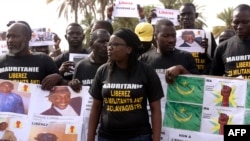Born into slavery and kept as a servant for 30 years, Haby Mint Rabah is now running for parliament in Mauritania to fight for freedom in a nation with one of the world's worst slavery rates.
Rabah's candidacy is a first for the West African country, where more than two in every 100 people — 90,000 in total — live as slaves, according to the 2018 Global Slavery Index.
Slavery is a historical practice in Mauritania, which became the last country to abolish it in 1981. Black descendants of ethnic groups in the south are typically enslaved by lighter-skinned Mauritanians, often as cattle herders and servants.
Rabah, 44, was born into bondage and forced to work from age 5 as a maid and a field hand. She hopes to be a role model and show that freedom and a life after slavery are possible.
"I submitted my candidacy because I was a slave, like my parents and my parents' parents before me," she told the Thomson Reuters Foundation by phone from the capital, Nouakchott. "And I never saw a slave candidate in elections."
Mauritania criminalized slavery in 2007, but few slave owners have been penalized. Some members of the political elite deny that slavery still exists, and several activists who spoke out against it have been arrested and even jailed.
Mauritania's government has repeatedly denied restricting the activities of rights groups or making arbitrary arrests.
'I know that they exist'
"The day that I'm in parliament I will defend the slaves ... because I know that they exist and that they have many needs," Rabah said. "I'll be there for them."
Rabah will stand in the September 1 elections as a member of the Mauritanian Rally for Global Action, the political wing of the Initiative for the Resurgence of the Abolitionist Movement (IRA), in coalition with the more established Sawab party.
Rabah was freed in 2008 with the help of the IRA after one of her brothers escaped and alerted the anti-slavery group.
As a slave, her chores included carrying water and herding animals. Her master repeatedly raped and beat her, Rabah said.
"I suffered every kind of mistreatment," she added.
Slaves in Mauritania do not tend to escape because they are unaware of their rights and cannot envisage a life beyond slavery, said Boubacar Messaoud, president of rights group SOS Esclaves.
"[Rabah's candidacy] is something that should encourage slaves to lift their heads ... to see that when you are free, you have the possibility to access everything the others always had," Messaoud said.





